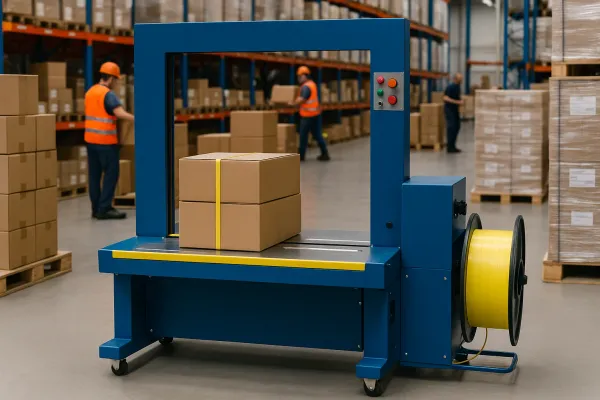Avoid your inquiry is delay response, please enter your WhatsApp/Skype along with the message, so we can contact you at the very first time.
We will reply you within 24 hours. If for urgent case, please add WhatsApp/WeChat: ,. Or call directly.
Strapping products by hand takes time and effort, especially when you have high volumes of goods to package. That’s when a strapping machine steps in.
A strapping machine automatically applies straps to packages, securing them for shipping and handling with consistent strength and precision.

Strapping machines have become a vital part of packaging systems, saving time and improving efficiency in any operation that deals with large shipments or heavy packages.
Manual strapping can be exhausting and inconsistent. I remember when we used to strap everything by hand — it was inefficient and unreliable.
Strapping machines work by automatically applying a strap around a package, tightening it, and sealing the ends to ensure it stays secure during transport.
Here’s how a strapping machine works in simple steps:
| Step | Description |
|---|---|
| 1 | Package Positioning: The package is placed on the conveyor or strapping platform. |
| 2 | Strap Feeding: The machine feeds the strap around the package automatically. |
| 3 | Strap Tightening: The strap is tightened to the desired tension to secure the package. |
| 4 | Sealing: The ends of the strap are sealed using heat or friction. |
| 5 | Cutting: The machine cuts the strap and releases the finished package. |
What makes this process valuable is the consistency it brings to every package. With manual strapping, it’s difficult to ensure the same tension every time, but with automation, it’s precise and quick. When we started using an automatic strapping machine1, the productivity levels in our warehouse soared, and the number of package complaints dropped dramatically.
When we transitioned from manual to automated strapping, the changes were immediate. We eliminated labor-intensive processes and sped up our packaging lines.
Strapping machines offer increased efficiency, consistency, and safety in packaging, reducing labor costs and improving the quality of each shipment.

Let me explain how this simple machine gave us such a significant advantage:
With manual strapping, each package took 2–3 minutes. Now, our machine straps 20+ packages per minute. That’s a massive increase in efficiency.
We no longer need as many staff to handle packaging. The strapping machine does most of the work, allowing our team to focus on higher-value tasks.
The machine applies the same tension and sealing quality for every package. No more loose or over-tight straps.
Strapping by hand can lead to repetitive strain injuries. With the machine doing the heavy lifting, the risk of injury significantly drops.
| Factor | Manual Strapping | Strapping Machine |
|---|---|---|
| Speed | Slow (5-10/min) | Fast (20+/min) |
| Labor | High | Low |
| Error Rate | High | Minimal |
| Cost | High (more staff) | Low (automation) |
It’s also worth mentioning how much less waste we have now. The machine uses the right amount of strap and applies it precisely, cutting down on wasted materials that we saw when strapping by hand.
I’ve seen strapping machines in action across multiple industries. The benefits vary, but the machine consistently delivers value where large quantities of goods need secure packaging.
Industries such as logistics, e-commerce, manufacturing, and retail benefit the most from using strapping machines due to their volume needs and packaging requirements.
Here are the sectors that get the most out of strapping machines:
These companies ship goods in large quantities, and strapping machines help them bundle items securely for transportation. Whether it’s pallets of goods or large boxes, strapping ensures safety during transit.
With the rise of online shopping, e-commerce2 businesses often package products for delivery. Strapping machines allow them to quickly and securely package orders for customers.
For manufacturers, strapping is a part of final packaging. With a machine, the company can ensure that products such as parts or components stay bundled together and are protected.
Retailers dealing with high volumes of packaged goods can reduce the risk of damage during storage and transport by using strapping machines to secure pallets.
| Industry | Use Case |
|---|---|
| Logistics | Bundles for shipment, secure pallets |
| E-Commerce | Fast, secure packaging of orders |
| Manufacturing | Packaging parts and components |
| Retail | Securing bulk packages for transport |
In our plant, we used to have packaging errors and damages during shipping. Now, thanks to our strapping machine, our products arrive intact, with far fewer returns or complaints.
When it was time to upgrade, I had to decide between a manual or automatic strapping machine. I was initially drawn to the manual model because it was cheaper, but I quickly realized it wasn’t the best long-term solution.
Manual strapping is cost-effective but labor-intensive. Automatic strapping machines offer high-speed, consistent results but come with a higher upfront cost.

Here’s a comparison to help you decide which system fits your needs:
| Feature | Manual Strapping | Automatic Strapping |
|---|---|---|
| Cost | Low | High |
| Speed | Slow (5-10/min) | Fast (20+/min) |
| Labor | High | Low |
| Maintenance | Moderate | Low (with proper care) |
| Flexibility | Limited | High (supports multiple packages) |
If you’re a smaller operation or just starting out, manual strapping might make sense. But if you’re handling higher volumes or looking to scale, automatic machines are definitely the way to go.
For us, once we hit a certain production threshold, the automatic machine was a no-brainer. The time we saved, the reduction in errors, and the ability to handle more packages per hour paid for the upgrade quickly.
Strapping machines revolutionize the packaging process. Whether manual or automatic, they improve speed, reduce labor costs, and ensure consistent results, which ultimately leads to smoother operations and better customer satisfaction.